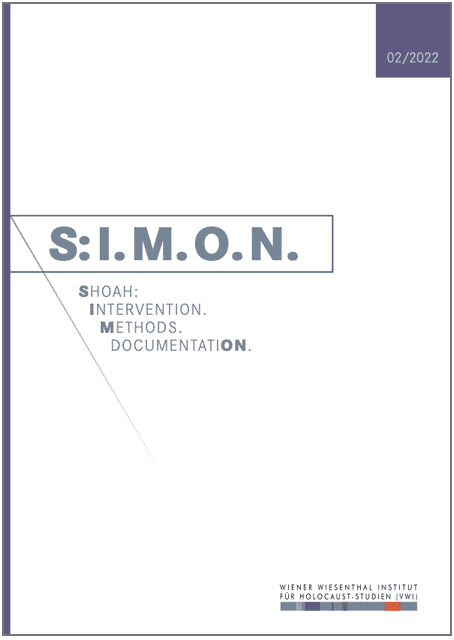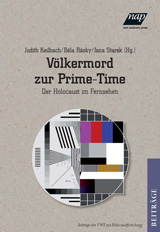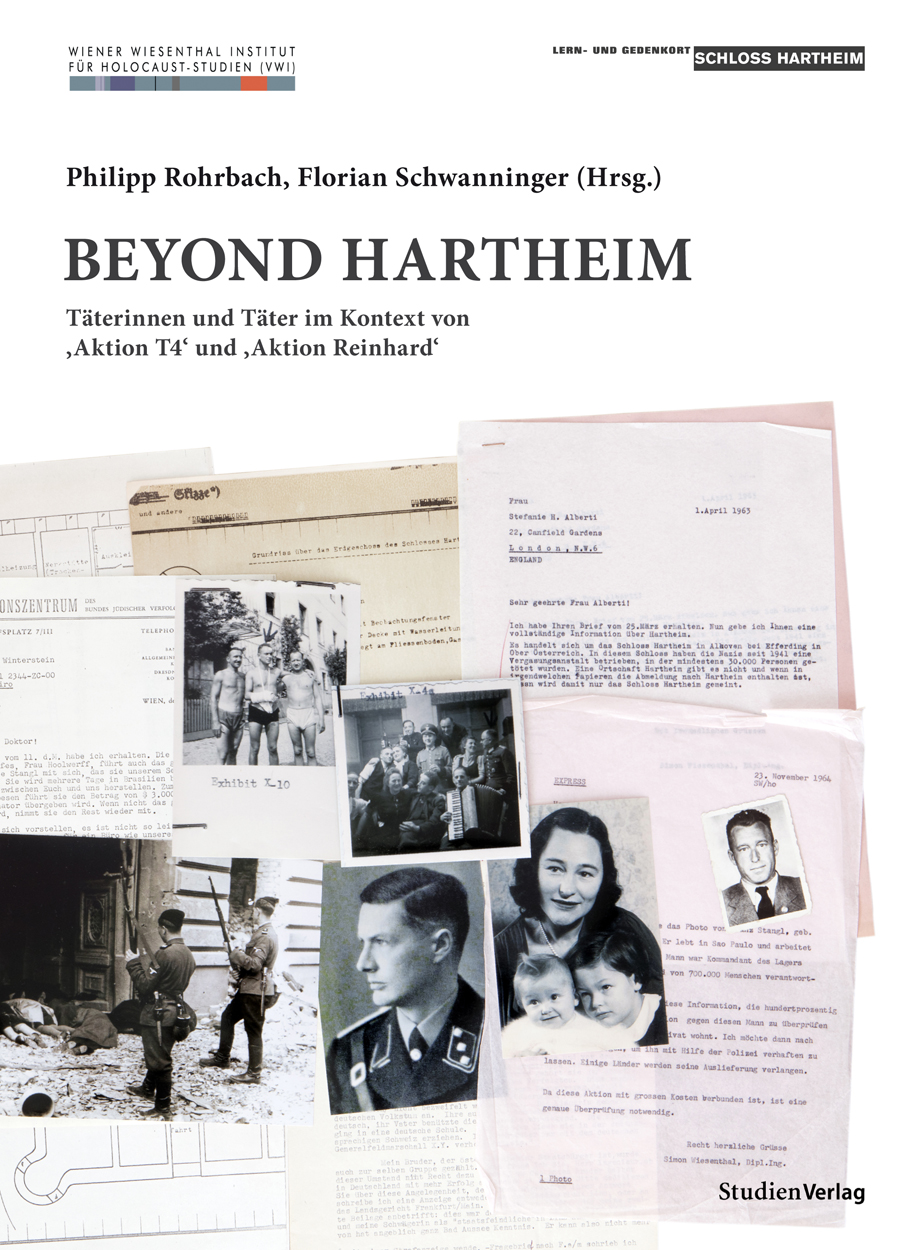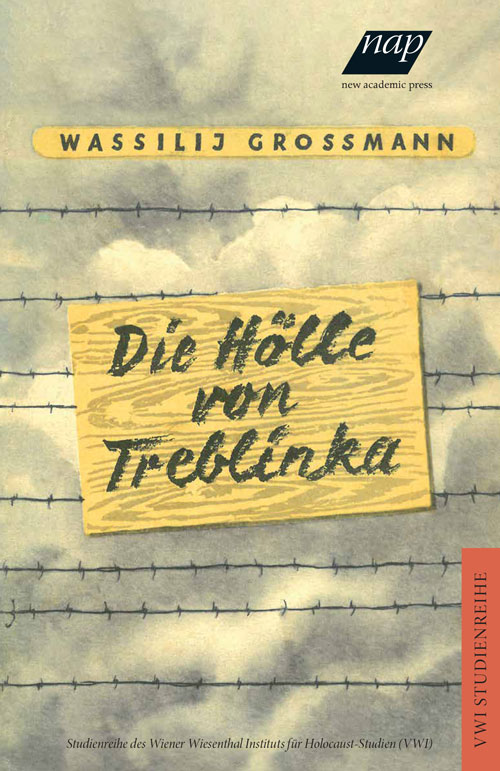News – Events – Calls
| 24. April 2024 19:00 BuchpräsentationIngeborg Bachmann, Marie Luise Kaschnitz, Hilde Domin, Nelly Sachs: Über Grenzen sprechend. Briefe. Piper/Suhrkamp, München, Berlin, Zürich 2023Ingeborg Bachmann stand mit zentralen Protagonistinnen der deutschsprachigen Literatur im Austausch, nun werden ihre Briefwechsel mit Marie Luise Kaschnitz, Hilde Domin und Nelly Sachs erstmals zugänglich gemacht. Die Briefe geben Einblick in die Lebensbedingungen, das literarische S...Weiterlesen... |
| 02. May 2024 18:30 Simon Wiesenthal LectureEdyta Gawron: Never Too Late to Remember, Never Too Late for Justice! Holocaust Research and Commemoration in Contemporary PolandIn 1994, Simon Wiesenthal received a doctorate honoris causa from the Jagiellonian University in Krakow for his lifelong quest for justice – half a century after he had been, for a short time, prisoner of the local Nazi Concentration Camp (KL) Plaszow. The 1990s were the decade when t...Weiterlesen... |
| 07. May 2024 00:00 - 04. June 2024 00:00 WorkshopDealing with Antisemitism in the Past and Present. Scientific Organisations and the State of Research in AustriaThis series of talks, presented by antisemitism experts from different organisations that research antisemitism using a variety of academic approaches, aims to provide a snapshot of historical evolutions, current events, prevalent perceptions and declared (and undeclared) attitudes. I...Weiterlesen... |
| 14. May 2024 08:45 - 16. May 2024 16:30 TagungQuantifying the Holocaust. Classifying, Counting, Modeling: What Contribution to Holocaust History? About the conference: https://quantiholocaust.sciencesconf.org/ Programme timed on the basis of 15-minute presentations + 15-minute discussions; short breaks and lunches Day 1 Tuesday, 14 May 2024Centre Malher (9 rue Malher 75004 Paris/amphi Dupuis) From 8.45 am: Welcome9.30 am...Weiterlesen... |
| 24. May 2024 18:00 InterventionLange Nacht der Forschung 20242024 öffnet das Wiener Wiesenthal Institut für Holocaust-Studien (VWI) in der Langen Nacht der Forschung wieder seine Tore und lädt Interessierte in seine Räumlichkeiten am Rabensteig 3 ein. Im Rahmen von Vorträgen, Podiumsdiskussionen und Präsentationen bieten VWI-Team und Gäste Einb...Weiterlesen... |
Obituary: Hella Pick (1929–2024)
 “1939: a Kindertransport refugee designated as an ‘Enemy Alien’. 2000: Commander of the British Empire. 2018: first an Honorary Doctorate from Sussex University and then the accolade of a new identity as a BBC podcast destined to remain for all eternity on a distant desert island. These are markers in a colourful life and a long career that offered a role model for women in journalism. It has been quite a journey.” (Hella Pick, Invisible Walls, p. 293)
“1939: a Kindertransport refugee designated as an ‘Enemy Alien’. 2000: Commander of the British Empire. 2018: first an Honorary Doctorate from Sussex University and then the accolade of a new identity as a BBC podcast destined to remain for all eternity on a distant desert island. These are markers in a colourful life and a long career that offered a role model for women in journalism. It has been quite a journey.” (Hella Pick, Invisible Walls, p. 293)
Hella Pick died in London on the night of 4 April at the age of 94. As a foreign correspondent for the Guardian, she reported on turning points in the history of the 20th century – from the end of British colonial rule in West Africa, the highlights of the US civil rights movement and the student protests in Paris in 1968 to the end of the Cold War. Her memoirs read like a Who’s Who of the 20th century and provide insights into the struggle for recognition as a female journalist in a male-dominated field of work.
The Vienna Wiesenthal Institute for Holocaust Studies mourns the loss of the journalist, Wiesenthal biographer, contemporary witness, and advocate against forgetting. We remember Hella Pick’s visits, most recently in November 2022, when she presented her autobiography Invisible Walls. A Journalist in Search of Her Life.
It has been quite a journey.
Photo: © VWI
Schließtage der VWI-Bibliothek – Closing days of the VWI Library
Die Bibliothek ist von 1. bis 5. April 2024 geschlossen.
The library will be closed from 1 to 5 April 2024.
The Lodz Ghetto and the Kriminalpolizei: Jews, Neighbors, and Perpetrators in the Holocaust
VWI Senior Fellow Winson Chu will hold the Max Weinreich Fellowship Lecture in Eastern European Jewish Studies at the YIVO Institute for Jewish Research in New York on Thursday, 4 April 2024.
The German criminal police (Kriminalpolizei, or Kripo) maintained a permanent station in the Lodz ghetto, which over the four years of its existence imprisoned some 200,000 Jews. Responsible for stopping smuggling networks and for gathering information about hidden possessions inside and outside the ghetto, the Kripo relied heavily on local ethnic Germans, the so-called Volksdeutsche. These policemen exploited their prewar social networks in their investigations and carried out violent acts against Jews familiar to them. They deployed their Polish and Yiddish language skills in interrogations of suspects, and they used their knowledge of Jewish religious practices and local customs to spy on the Jews and later to evaluate their confiscated property.
In this talk, Winson Chu focuses on how police records in Poland and survivor sources at YIVO enable a better understanding of such prewar connections with wartime perpetrators. By providing additional detail and context to existing accounts of ghetto experiences, this approach re-embeds Jews into interethnic relations in prewar Lodz and Nazi-occupied Poland and questions the common perception of the Lodz ghetto as “hermetically sealed.”
EHRI Workshop and Microarchives in Austria
 The full-day workshop "EHRI and Microarchives in Austria" took place at the Vienna Wiesenthal Institute for Holocaust Studies (VWI) on 4 March 2024. The Institute presented EHRI's plans to improve support for microarchives and invited Austrian microarchive owners and experts to discuss the opportunities and challenges of collaboration. The microarchive owners shared their wishes and requirements with the VWI-EHRI team, which may lead to further cooperation.
The full-day workshop "EHRI and Microarchives in Austria" took place at the Vienna Wiesenthal Institute for Holocaust Studies (VWI) on 4 March 2024. The Institute presented EHRI's plans to improve support for microarchives and invited Austrian microarchive owners and experts to discuss the opportunities and challenges of collaboration. The microarchive owners shared their wishes and requirements with the VWI-EHRI team, which may lead to further cooperation.
Workshop: Europe and the USSR. Literature in the Face of the Persecution and Extermination of the Jews
A workshop organised by VWI Senior fellow Atinati Mamatsashvili, hosted by the VWI on 22 March 2024
The workshop’s purpose is to examine the literary, artistic, musical and cinematographic responses to the rise of anti-Semitism in the 1930s, which led to the systematic persecution and extermination of Europe’s Jews. It will focus on the period before as well as after the war. This will allow to consider, on the one hand, the capacity of literature (and other media) to project an aftermath as a consequence of ongoing events, and on the other hand the aftermath as it was felt in the years following the Shoah.
What was the response or capability of writers who were subjected to censorship during the Stalinist and post-Stalinist regimes? How did authors depict the re-emergence of anti-Semitism in the Soviet Union and European countries in the decades before and after the Second World War in their literary (artistic) works? This workshop aims to raise initial questions on a vast subject that is still very under-explored in certain areas and from certain perspectives, such as minor literature and forgotten writers.
Organisers
Anke Bosse (Universität Klagenfurt/Musil-Institut/Kärntner Literaturarchiv)
Atinati Mamatsashvili (Ilia State University / Wiener Wiesenthal Institut für Holocaust-Studien)
Statement by the Vienna Wiesenthal Institute for Holocaust Studies (VWI) On the Current Rise in Antisemitism Worldwide
The VWI condemns the drastic rise in anti-Semitic incidents of verbal and physical violence and the global threat to Jews following the terrorist attacks by Hamas on Israeli residential areas on 7 October 2023. On the night of 1 November 2023, the ceremonial hall in the Jewish section of Vienna’s Central Cemetery was set on fire.
New EHRI Podcast: A Sunflower for Simon Wiesenthal
 The first episode of the second season of the EHRI Podcast "For the Living and the Dead. Traces of the Holocaust“ has just launched. This episode is called "A Sunflower for Simon". Katharina Freise talks to VWI's Marianne Windsperger and Kinga Frojimovics about Simon Wiesenthal’s sunflowers, real ones, or artificial and made from paper or any other material. In 1969, Holocaust survivor and author Simon Wiesenthal wrote The Sunflower. On the Possibilities and Limits of Forgiveness. In this book, he recounted his experience with a mortally wounded Nazi soldier during World War II, and then asked prominent figures from politics, science and theology the question about what they would do under the circumstance.
The first episode of the second season of the EHRI Podcast "For the Living and the Dead. Traces of the Holocaust“ has just launched. This episode is called "A Sunflower for Simon". Katharina Freise talks to VWI's Marianne Windsperger and Kinga Frojimovics about Simon Wiesenthal’s sunflowers, real ones, or artificial and made from paper or any other material. In 1969, Holocaust survivor and author Simon Wiesenthal wrote The Sunflower. On the Possibilities and Limits of Forgiveness. In this book, he recounted his experience with a mortally wounded Nazi soldier during World War II, and then asked prominent figures from politics, science and theology the question about what they would do under the circumstance.
The “Sunflower” in the title referred to Wiesenthal's observation of a German military cemetery, where he saw a sunflower on each grave, while he was imprisoned in the Janowska concentration camp near Lviv and feared for his own body to end up in an unmarked mass grave.
The book touched many people, some of whom then expressed their emotions by sending sunflowers, real or crafted, to Wiesenthal’s office.
Listen to the episode on Buzzsprout, Spotify, Apple Podcasts, Google Podcasts or on the webpage: https://www.ehri-project.eu/podcast-episode-sunflower-simon.
Was geschah in der Ankerbrotfabrik während der NS-Zeit? Ein Inselmilieu-Podcast
 Inselmileu Reportage hat einen zweiteiligen Podcast über die Ankerbrotfabrik während der NS-Zeit produziert. Teil eins der Doppelfolge befasst sich mit der Arisierung und dem späteren Umgang des Unternehmens mit der NS-Geschichte bzw. deren Ausblendung. Die zweite Folge – für die der wissenschaftliche Mitarbeiter des VWI Philipp Rohrbach sowie Direktor Jochen Böhler interviewt wurden – widmet sich den Verstrickungen der Vorfahren vieler Österreicher:innen in die Verbrechen der NS-Zeit sowie ungarisch-jüdischer Zwangsarbeit in der Ankerbrotfabrik, die bis heute wenig thematisiert wurde. Die Inhalte des Gesprächs basieren unter anderem auf den Recherchen folgender VWI-Projekte zu ungarisch-jüdischer Zwangsarbeit 1944/45:
Inselmileu Reportage hat einen zweiteiligen Podcast über die Ankerbrotfabrik während der NS-Zeit produziert. Teil eins der Doppelfolge befasst sich mit der Arisierung und dem späteren Umgang des Unternehmens mit der NS-Geschichte bzw. deren Ausblendung. Die zweite Folge – für die der wissenschaftliche Mitarbeiter des VWI Philipp Rohrbach sowie Direktor Jochen Böhler interviewt wurden – widmet sich den Verstrickungen der Vorfahren vieler Österreicher:innen in die Verbrechen der NS-Zeit sowie ungarisch-jüdischer Zwangsarbeit in der Ankerbrotfabrik, die bis heute wenig thematisiert wurde. Die Inhalte des Gesprächs basieren unter anderem auf den Recherchen folgender VWI-Projekte zu ungarisch-jüdischer Zwangsarbeit 1944/45:
Ungarisch-jüdische Zwangsarbeit in Wien 1944/45
Projektbeschreibung
Kinga Frojimovics and Éva Kovács: Jews in a ‘Judenrein’ City: Hungarian Jewish Slave Laborers in Vienna (1944–1945)
Anzuhören auf: Spotify, Apple Podcasts oder auf der offiziellen Website.
Jom Kippur/Yom Kippur
Das Wiener Wiesenthal Institut für Holocaust-Studien (VWI) bleibt während Jom Kippur am Montag, 25. September 2023, geschlossen.
Vielen Dank für Ihr Verständnis!
The Vienna Wiesenthal Institute for Holocaust Studies (VWI) will be closed during Yom Kippur on Monday, 25 September 2023.
Thank you for your understanding!
Rosch ha-Schana/Rosh Hashanah
Das Museum Simon Wiesenthal bleibt heute, am 15. September 2023, ab 14:00 Uhr (Rosch ha-Schana) geschlossen.
Vielen Dank für Ihr Verständnis!
The the Museum Simon Wiesenthal will be closed today, 15 September 2023, at 2 p.m. (Rosh Hashanah).
Thank you for your understanding!
Heidemarie Uhl (1956–2023)
 Mit großem Bedauern vernahmen wir die Nachricht des Ablebens der renommierten Historikerin Heidemarie Uhl (1956–2023). Die langjährige Mitarbeiterin der Österreichischen Akademie der Wissenschaften bzw. des Instituts für Kulturwissenschaften und Theatergeschichte (IKT) war eine der wichtigsten und prägendsten Stimmen der österreichischen Gedächtniskultur in den Bereichen Nationalsozialismus, Antisemitismus und Holocaust. Das Wiener Wiesenthal Institut für Holocaust-Studien (VWI) verdankt ihr zahlreiche konstruktive und bereichernde Beiträge. Ihre Arbeit und ihr Engagement bleiben uns genauso in Erinnerung wie ihre grundehrliche, unterstützende und stets kollegiale Art. Ein unermesslicher Verlust für die Forschungslandschaft.
Mit großem Bedauern vernahmen wir die Nachricht des Ablebens der renommierten Historikerin Heidemarie Uhl (1956–2023). Die langjährige Mitarbeiterin der Österreichischen Akademie der Wissenschaften bzw. des Instituts für Kulturwissenschaften und Theatergeschichte (IKT) war eine der wichtigsten und prägendsten Stimmen der österreichischen Gedächtniskultur in den Bereichen Nationalsozialismus, Antisemitismus und Holocaust. Das Wiener Wiesenthal Institut für Holocaust-Studien (VWI) verdankt ihr zahlreiche konstruktive und bereichernde Beiträge. Ihre Arbeit und ihr Engagement bleiben uns genauso in Erinnerung wie ihre grundehrliche, unterstützende und stets kollegiale Art. Ein unermesslicher Verlust für die Forschungslandschaft.
It was with great sadness that we heard the news of the passing of the renowned historian Heidemarie Uhl (1956-2023). A long-time staff member of the Austrian Academy of Sciences and the Institute for Culture Studies and Theatre History (IKT), she was one of the most important and influential voices in the Austrian culture of memory in the areas of National Socialism, anti-Semitism and the Holocaust. The Vienna Wiesenthal Institute for Holocaust Studies (VWI) owes her numerous constructive and enriching contributions. We will always remember her work and commitment as well as her honest, supportive and always collegial manner. An immeasurable loss for the research landscape.










